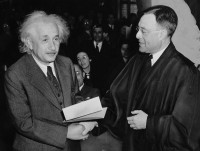Seeking Justice for E=mc2
 In February of 1950, a devoted follower of Albert Einstein wrote him a letter prompted by the death of his son. He questioned Einstein's belief that physical death cannot be transcended. His grief could only be overcome if Einstein were to endorse a theory wherein his love for his son would render the latter immortal [1]. Einstein wrote back to the grief-stricken father, grimly but pragmatically choosing to focus on nursing his mental health back to a more peaceful state, than on any theories about his son's death.
In February of 1950, a devoted follower of Albert Einstein wrote him a letter prompted by the death of his son. He questioned Einstein's belief that physical death cannot be transcended. His grief could only be overcome if Einstein were to endorse a theory wherein his love for his son would render the latter immortal [1]. Einstein wrote back to the grief-stricken father, grimly but pragmatically choosing to focus on nursing his mental health back to a more peaceful state, than on any theories about his son's death.
Einstein was no longer be confined to the boundaries of simply being a scientist, after having overhauled the basics of physics and laying down critically fundamental theories about the intricacies of the atom. His theories and ideas had crossed over the realms of physics, and poured heavily into philosophy and religion. But because he supported his ideals with equations and research papers instead of placards and politics, many a common man believed him-some even sought consolation from him on their cloudy days. He was a one-man revolution, who was unknowingly-unwittingly, even-going to change the course of the world.
Einstein never kept his gifts to himself; he was known to encourage and inspire intelligence. He found time amidst his career and increasing fame to exchange letters with Tyfanny, a South-African girl who would write to him about her ambitions and past reservations about her gender being a handicap. He had once promptly replied to her, stating that he was glad she discontinued her doubts [2].
Although Einstein received significant help in establishing his many theories (Max Planck defended his theory of relativity over Newtonian physics), his habit of intentionally questioning authority, and persistent abstinence from conventional views of life, death and philosophy garnered him rejections from the scientific community that he frequently displeased. This exam-failing and experiment-exploding reckless student eventually emigrated to America in 1933 and proceeded to unify different realms of physics into a single theory, an approach that clashed with most physicists at the time.
In 1939, before the start of the war, fearing that the Germans might devise a bomb, Einstein signed a letter to U.S. President Franklin D. Roosevelt urging the hastening of research into nuclear fission and chain reactions. This concluded Einstein's direct involvement in creating the atom bomb, an action he would later come to deeply regret. His intentions regarding the capabilities of chain reactions were quite peaceful, though. It is Einstein's famous mass-energy equivalence equation that has become the fundamental basis of nuclear energy generation, although Einstein himself was doubtful about the practicalities of their use. He said:
"To give any estimate when atomic energy can be applied to constructive purposes is impossible. ... Since I do not foresee that atomic energy is to be a great boon for a long time, I have to say that for the present it is a menace." [3]
It is not difficult to believe why a man of highly progressive ideals would also possess discouraging views on the peaceful use of nuclear power-he felt partially responsible for the deaths caused by the atom bombs. It would also be unfair to infer that he had created a monster-his theories enabled the future generations to build processes to harness nuclear power for the production of continuous, reliable, clean and cheap electricity. Any technology that exists is inherently capable of being misused, which would be a fundamentally short-sighted approach towards any personal or political ideal. But using the technology to enable growth and prosperity would prove us worthy of the planet we have been gifted to share.
Today many countries depend on nuclear power to power their homes and appliances and daily lives. On the occasion of his 139th birthday this day, the best gift the world can give him is the promise of continuing, and increasing, the use of nuclear power for the betterment of the world, the one thing he desired to achieve yet also regretted. Einstein may not be with us anymore to receive the gift, but his peaceful mass-energy equation will have sought justice.
[1] https://www.brainpickings.org/2017/03/14/einstein-grieving-father-letter
[2] Dear Professor Einstein: Albert Einstein's Letters to and from Children
[3] https://www.wiseinternational.org/nuclear-monitor/802/albert-einstein-nuclear-weaponss
[4] http://immigrationtounitedstates.org/473-albert-einstein.html
Feel free to leave a constructive remark or question for the author in the comment section below.

